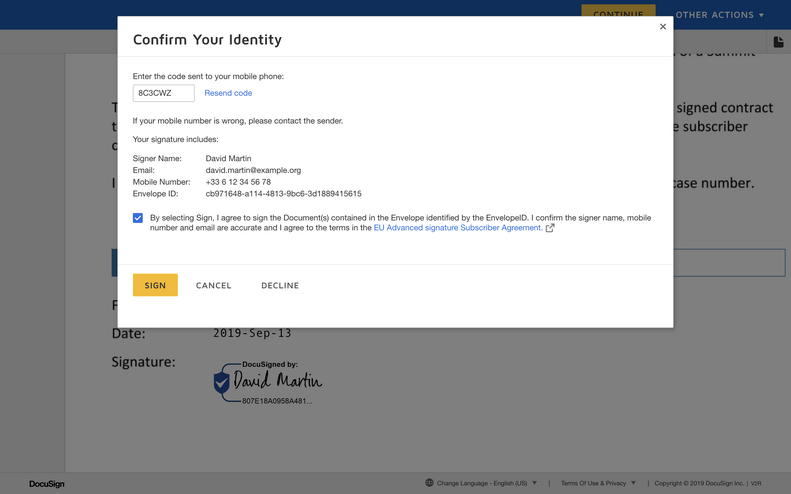You are viewing our site as an Agent, Switch Your View:
Agent | Broker Reset Filters to Default Back to ListAre Electronic Signatures Legal?
October 07 2020
 Electronic signatures (e-signatures), which demonstrate an individual's intent to agree to something, aren't new. Their acceptance and use in many countries around the world have been widespread for years. Hundreds of millions of users worldwide are comfortable signing documents electronically. But are electronic signatures legal?
Electronic signatures (e-signatures), which demonstrate an individual's intent to agree to something, aren't new. Their acceptance and use in many countries around the world have been widespread for years. Hundreds of millions of users worldwide are comfortable signing documents electronically. But are electronic signatures legal?
The short answer is yes, electronic signatures are legal. But what this question is really getting at is whether an e-signature can create a binding and enforceable contract. And, again, the short answer is yes. Electronic signatures are widely recognized and accepted throughout the industrialized world, and they're also more secure than traditional paper-based signatures and thus less susceptible to forgery.
In this post, we'll cover what makes e-signatures legally binding, whether they're valid in all U.S. states, whether there are exceptions, what exactly is an e-signature (a lot of people think it's a digital image of the "squiggly line," i.e., your wet signature, but that's not the case) and more.
What makes an electronic signature legally binding?
In the U.S. and other industrialized countries, electronic signatures and records can carry the same weight and legal effect as traditional handwritten signatures and paper documents. The Electronic Signatures in Global and National Commerce Act (ESIGN) and the Uniform Electronic Transactions Act (UETA) in the United States, the Electronic Identification and Trust Services Regulation (eIDAS) in the European Union and other similar laws throughout the world were enacted to recognize the enforceability of e-signatures.
In fact, when e-signatures are combined with tamper sealing, strong authentication, world-class security and an audit trail, they can be more enforceable than wet signatures because of the court admissible evidence they contain.
That said, like anything in life, there are some exceptions to these laws (see the next question "Can legal documents be signed electronically?"). However, it's not that e-signatures can't be used in these situations. It's just that they may be subject to additional legal requirements in order to be enforceable. You should always look to the laws in your jurisdiction regarding your specific e-signature use case.
Can legal documents be signed electronically?
Electronic documents and signatures are broadly enforceable for business and personal transactions in industrialized countries around the world. Many court filings can also be signed electronically, including:
- Litigation filings, such as deposition transcripts, incident descriptions, medical releases, settlements
- Transactions, such as closing documents, disclosures, financings, legal filings, NDAs, real property transaction documents
However, there are some use cases that aren't typically appropriate for e-signature or aren't covered by ESIGN or other country-specific laws, like the few examples below. You should seek legal advice as to whether e-signatures are allowed in these situations and what the requirements are:
- Wills and other estate documents, family law matters, certain court orders and official court documents
- Business use cases such as cancellation of utility services, termination of health/life insurance benefits, health/safety recalls, handling of toxic materials and notices regarding primary residence (e.g. such as a foreclosure)
Are electronic signatures valid in all states?
Yes, electronic signatures are valid in all U.S. states and are granted the same legal status as handwritten signatures under state laws.
The District of Columbia, Puerto Rico, the Virgin Islands and 47 states have adopted UETA, and most of these have made few, if any, modifications to UETA. Only three states (New York, Illinois and Washington) maintain their own independently developed laws, but all of them are consistent with UETA.
However, even with the slight differences among the states, there's enough consistency to permit all businesses to adopt a single process for electronically signing agreements across the country for most use cases.
Learn more in the "Electronic Signatures and Transactions in the U.S." whitepaper.
What is the difference between a digital signature and an electronic signature?
The terms "digital signature" and "electronic signature" are often used interchangeably, but they're actually different.
Digital signatures are a specific type of e-signature that has an additional signer authentication element. Digital signatures include a "digital certificate" that's issued only when the identity of the signer is validated, and they use a type of encryption called public key infrastructure (PKI) to associate a signer with a document and provide additional assurance as to the signer's identity.
E-signatures, on the other hand, cover the full range of technologies and solutions to create signatures electronically, from simple images of a signature attached to an electronic document to PKI-based signatures. A variety of capture methods can be used, such as:
- Typing your name in a signature box
- Signing your name on a courier's digital device
- Using an e-signature solution
The extra steps needed to obtain a digital signature are unnecessary for many transactions in the U.S., so they're rarely used. An electronic signature is typically all a customer needs to create a legally enforceable document. For those instances where more authentication is required in the U.S. (e.g., certain transactions in regulated industries such as life sciences), tools like DocuSign Standards-Based Signatures can be used to digitally sign a document. This also applies to regions like the European Union, where digital signatures are more common.
The best approach is to evaluate whether there's a need for a digital signature, and if not, why complicate things? For more on the admissibility of DocuSign eSignatures and electronic signatures overall, read DocuSign's "Court Support for Electronic Signatures in the United States" whitepaper.
To view the original article, visit the DocuSign blog.









